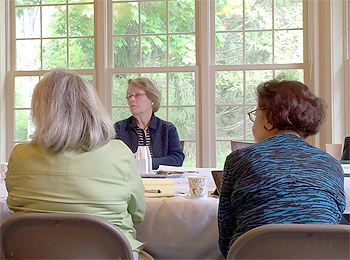An article headlined "Do We Need Libraries?" was on the agenda of the May 16 Quogue Library board meeting. "Who needs a library when it is possible, without even getting out of bed, to read almost any book or article that has ever been published?" the article began.
|
|
The writer was Forbes contributing editor Steve Denning who was keynote speaker at the combined meeting of the Library Leaders Summit and Computers in Libraries conference in Washington in late April.
The topic was not discussed at the one hour and 45-minute meeting of the board May 16. Also not discussed was whether O'Dwyer materials on the dispute about the eruv Jewish boundary in the Hamptons would be kept on file at the library. Lynda Confessore, president, said the topic will be taken up at the board’s meeting in June.
Denning drew from the Big Bang Disruption by Larry Downes and Paul Nunes, a 272-page book that tallies products and services either greatly weakened or made obsolete by smartphones.
Many Products, Services Threatened
Besides libraries, listed are newspapers and magazines, home telephones, answering machines, Yellow Pages, transistor radios, video cameras, dashboard navigation systems, address books, video cameras, wristwatches, alarm clocks, maps, flashlights, Walkmen, directory assistance, travel and insurance agents, and pocket calculators.
|
|
"Whole sectors of commerce are under threat," Denning told the library conference. Taxis are being replaced by Uber and Lyft, hotels are threatened by Arbnb which has 800,000 listings in 33,000 cities, Zipcar and Car2Go provide cars without the expense of buying one, and video stores like Blockbuster have succumbed to Netflix and Amazon.
"There is no reason to think that libraries are necessarily immune from the Grim Reaper of disruption," Denning wrote in Forbes. He posed the question, "Do libraries have any future at all?"
Denning Has No Answer But ALA Does
"The future of libraries is a story that has yet to be written," said Denning. "I don’t pretend to have ‘the answer’ to that story," he said. "The only thing we know for sure is that the story will be different from the story of libraries in the past."
He challenges libraries to be more "user" oriented and for library personnel shift from being "controllers" to being "enablers." He would like less "bureaucracy" in which "power trickles down from the top" of library staffers.
Denning did not mention the program of the American Library Assn. which says that the new role of libraries is to host public discussions on controversial topics.
This would be a sea change for the culture of libraries which has been to insist on silence in its facilities.
ALA Promotes Dialog
ALA in 2014 awarded $4,500 grants to 125 libraries that took its "Muslim Journeys Bookshelf" that included 25 books, four DVDs and other materials on "people, places, history, faith and cultures of Muslims in the U.S. and elsewhere."
The Smithville, Texas library took the ALA’s Gordon M. Conable Award for promoting "diverse points of view" and "promoting community dialog on controversial issues."
Library staffers said they endured "angry" patrons who made the staff "fear for their safety." Opponents stole several books from the library and bragged about it on a website. About 30 of those at a public discussion expressed opposition to discussion of the topic in the library.
Amina Zarrugh, sociology grad student at the University of Texas/Austin, conducted a session on The Country of Men by Hirsham Matar that was attended by more than 100. The book details oppression under Libya’s Muammar Gaddafi.
Hampton libraries thus far have shown no interest in conducting public discussions on eruvim in the Hamptons. Only the Southampton library keeps written materials on the dispute on file.




 Husch Blackwell Strategies has added FleishmanHillard alum Michael Slatin as a principal in its public affairs group.
Husch Blackwell Strategies has added FleishmanHillard alum Michael Slatin as a principal in its public affairs group. Rory Cooper, a veteran Republican operative and policy specialist, has joined Teneo’s Washington office as senior managing director in its strategy & communications practice.
Rory Cooper, a veteran Republican operative and policy specialist, has joined Teneo’s Washington office as senior managing director in its strategy & communications practice. Brian Fallon, who served as national press secretary for Hillary Clinton’s 2016 presidential run, is signing on next month as Vice President’s Kamala Harris’ campaign communications director.
Brian Fallon, who served as national press secretary for Hillary Clinton’s 2016 presidential run, is signing on next month as Vice President’s Kamala Harris’ campaign communications director. TikTok is nothing more than a Chinese propaganda tool that poses “a grave threat to America’s national security and, in particular, impressionable children and young adults,” say two Congressmen who want the platform registered as a foreign agent.
TikTok is nothing more than a Chinese propaganda tool that poses “a grave threat to America’s national security and, in particular, impressionable children and young adults,” say two Congressmen who want the platform registered as a foreign agent. Public Strategies Washington has added Abbie Sorrendino, a former aide to now Senate Majority Leader Chuck Schumer.
Public Strategies Washington has added Abbie Sorrendino, a former aide to now Senate Majority Leader Chuck Schumer.


 Have a comment? Send it to
Have a comment? Send it to 
No comments have been submitted for this story yet.